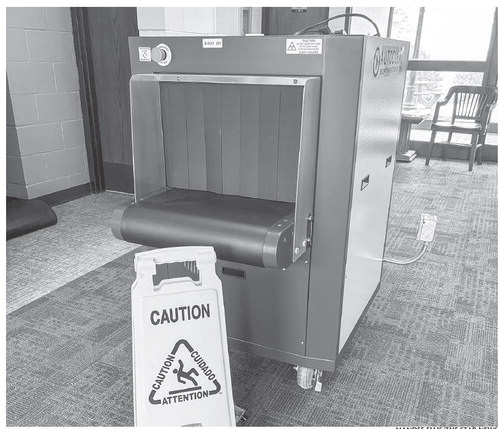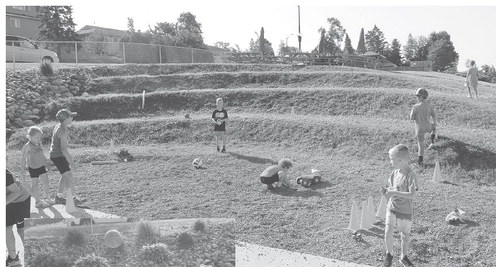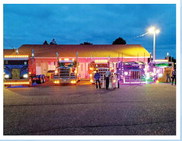Highway committee rejects weight exemption request for CTH E
Wood product company sought exemption to haul material, says it is needed to keep staff working
Spring road weight limits have long caused headaches for businesses that rely on transporting resources and finished material over the highways.
While state laws and local governments provide some exceptions to the weight limit restrictions, any exceptions are few and far between, as representatives from a local business learned when they came to the county highway commission on Tuesday.
“We are between a rock and a hard place,” said Jim Gebauer at Tuesday’s highway commission meeting. He told representatives from Jimmy Trucking that he did not support giving an exception to allow them to run heavier loads on a one-mile stretch of CTH E over concerns that it would open up a floodgate of other requests.
Spring road weight limits are in place throughout the state with the goal of protecting road bases from being damaged with heavy loads traveling over them. Unlike state highways which are built with six inches or more of road surface and bases able to withstand yearround heavy truck traffic, most town and county roads are built to far lower standards primarily for residential use.
Jimmy Trucking operates a log hauling business and sawmill which produces materials for pallets as well as selling wood chips for use in biomass fuel and paper making and sawdust for animal bedding.
The company is growing rapidly and currently employs 11 people with plans to expand in the future. They are currently located on a town road off of CTH E in the town of Hammel. Karie Thums said they would like to be on a state highway in the future, but the cost of land with state highway access has been prohibitive and instead located at the property of Russel Thums, the owner’s father and have made significant upgrades including extending three-phase power there.
According to owner Jimmy Thums his concern is with being able to keep his workers employed through the weight limit time and his customers supplied with materials. He said there has been a huge demand for pallet sticks and it is continuing to grow. “I could see owning my own pallet factory in the next 10 years,” he said.
He said they currently have hundreds of thousands of dollars worth of wood product in their yard and are looking to transport to customers. “We have to get our product out. We need to be able to recoup some income,” Karie Thums said.
Jimmy Thums noted that one of the challenges is making sure that they can keep their workers. A layoff due to having to shut down for road limits he said would cost him quality workers who would quickly go someplace else.
“It is hard to find good workers,” he said.
Gebauer, who was running the meeting in the absence of chairman Ray Soper, asked about the possibility of splitting loads to meet the weight limits.
Jimmy Thums noted that with the cost of fuel and labor this gets to be prohibitive “Trucking costs are astronomical,” he said. Commission members said they were sympathetic to the company’s concerns, however said they needed to protect the county’s roads from damage.
“If you guys ruin the road, the rest of the taxpayers suffer,” said committee member Chuck Zenner.
“It is the floodgates I worry about,” Gebauer said, expressing concern that if they allow one company, others will seek exemptions too.
Rather than allowing 10 full loads a week as requested, commission members and commissioner Ben Stanfley were willing to work with them to haul partial loads primarily in the early morning hours at lower speeds. It was noted the most damage occurs to the roads after the sun has been up and the surface heats up allowing the blacktop to separate from the base material.
“I am willing to do what we need to to make it work,” Jimmy Thums said.
Stanfley said he would work with the company to see what the weights on the sawdust and wood chips would be to allow them to haul out material. It was noted that there would be a time where the roads would not just be able to handle weight due to the thaw and they might need to stop hauling for a period of time. Zenner noted that if they can cut that down from six weeks to just a few weeks that would be a help.
In other business, commission members:
Approved moving ahead on applying for grant funds to mill and repave a section of CTH Q from CTH O to Hwy 64. Stanfley projected the county could see about a $77,000 local savings if they were able to get the grant funds, even though the overall project would be more expensive if done with grant requirements. The project would let out for bids in 2025.
Approved the annual materials bids. Despite a drop in oil prices, which heavily impact asphalt, asphalt prices are again going up. Stanfley said that pre-pandemic the asphalt was at $47.19 per ton and is currently at $60.87 per ton. This is up about 29%. This translates into the county needing to either spend more on roads or do fewer roads. At the current budget level, he said the roads went from a 32.4 year life cycle to being expected to last 42 years. “Things are pretty tight and we are kind of falling behind,” he said.
Received an update on the winter snow removal expenses. So far this year, the county has spent $444,000 on snow removal in the highway department, which is two-thirds of the total winter budget for the year. He said they are to the point where they will start cutting maintenance projects to ensure that there is enough money for snowplowing for the rest of this season and next fall. “Winter comes when it wants to come,” Stanfley said.
“We are between a rock and a hard place.”
— Jim Gebauer about weighing hurting business with potential damage to a county highway





